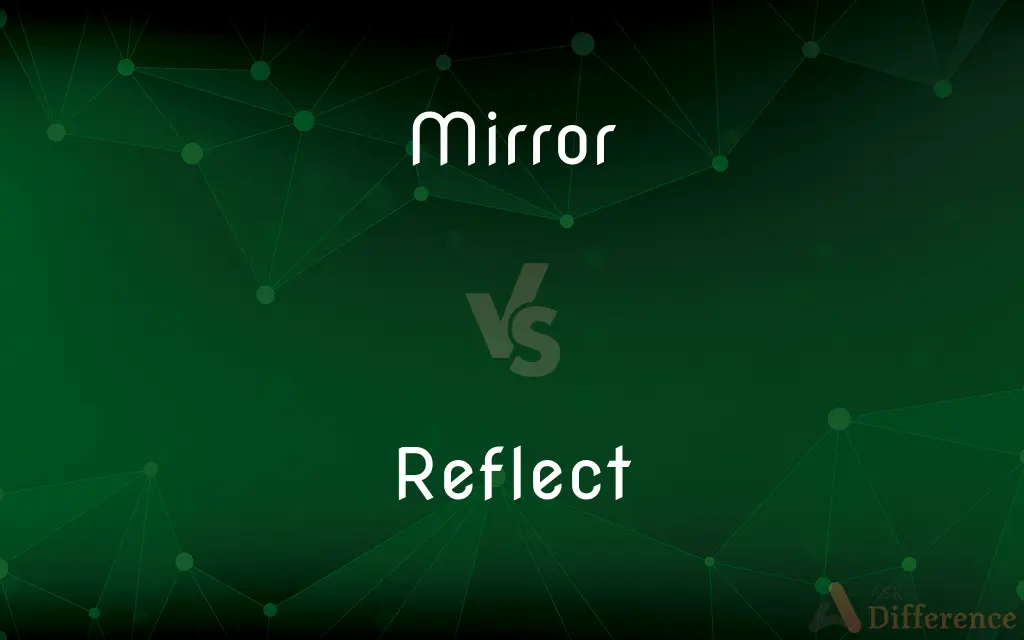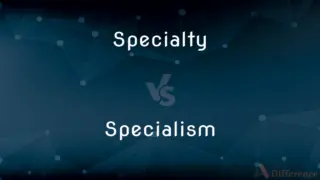Mirror vs. Reflect — What's the Difference?
By Tayyaba Rehman & Fiza Rafique — Updated on March 20, 2024
A mirror is a surface specifically designed to reflect images clearly, often made of glass with a metallic backing, while reflection is the process of light or images bouncing back from any surface.

Difference Between Mirror and Reflect
Table of Contents
ADVERTISEMENT
Key Differences
A mirror is an object that has been manufactured for the purpose of creating a clear and detailed reflection, often used for personal grooming or decorative purposes. Whereas reflection is a natural phenomenon that occurs when light waves bounce off objects, which can happen on any reflective surface, including water, metal, or glass.
Mirrors are typically made by coating a thin layer of metal, like aluminum or silver, on the back of a piece of glass. This construction is designed to optimize the clarity and accuracy of the reflection. On the other hand, reflection can occur on any surface that is smooth enough to bounce back light waves, and the quality of the reflection can vary widely depending on the material’s properties.
The primary function of a mirror is to provide a clear and precise image, which is why they are polished to achieve high reflectivity. Reflection, in contrast, does not necessarily result in a clear image, as the quality of the reflected image depends on the texture and color of the reflecting surface.
Mirrors are often used in optical devices and instruments, such as telescopes and lasers, where precise reflections are crucial for functionality. Reflection, on the other hand, is a broader concept that plays a significant role in various scientific principles, including the study of light, vision, and even heat transfer.
The science behind mirrors involves the law of reflection, which states that the angle of incidence equals the angle of reflection. Meanwhile, reflection as a general concept also follows this law, but its application extends beyond just mirrors, influencing how we perceive colors and patterns in our environment.
ADVERTISEMENT
Comparison Chart
Definition
A surface designed for clear image reflection.
The process of light bouncing back from a surface.
Composition
Typically glass with a metallic coating.
Can occur on any smooth surface.
Primary Use
Personal grooming, decoration, and optical devices.
Natural phenomenon observed in various contexts.
Image Clarity
Designed for high clarity and accuracy.
Depends on the surface’s properties.
Scientific Principle
Specifically utilizes the law of reflection.
Broadly applies to the law of reflection.
Compare with Definitions
Mirror
A polished surface reflecting a clear image.
The dancer checked her posture in the studio's large mirror.
Reflect
The return of light waves from surfaces.
The mountain’s reflection in the lake was breathtaking.
Mirror
A tool for signaling in survival situations.
Stranded hikers can use a mirror to signal airplanes.
Reflect
A principle in physics.
Reflection principles help us understand how light travels.
Mirror
An object used for personal grooming.
He used a handheld mirror to shave more precisely.
Reflect
A concept in philosophy and self-examination.
Quiet moments lead to reflection on one's life choices.
Mirror
A component in optical instruments.
The telescope's accuracy depends on its mirror's quality.
Reflect
A technique in photography.
She captured the sunset’s reflection in the skyscraper’s glass.
Mirror
A decorative element in homes.
The ornate mirror enhanced the living room's elegance.
Reflect
A vague or distorted image seen on non-polished surfaces.
His reflection in the rippling water was distorted.
Mirror
A mirror is an object that reflects an image. Light that bounces off a mirror will show an image of whatever is in front of it, when focused through the lens of the eye or a camera.
Reflect
To throw or bend back (light or sound, for example) from a surface.
Mirror
A surface, typically of glass coated with a metal amalgam, which reflects a clear image
He checked his appearance in the mirror
Reflect
To give back or show an image of (an object); mirror.
Mirror
(of a surface) show a reflection of
The clear water mirrored the sky
Reflect
To make apparent; express or manifest
Her work reflects intelligence.
Mirror
A surface capable of reflecting sufficient undiffused light to form an image of an object placed in front of it. Also called looking glass.
Reflect
To bring as a consequence
The victory reflects credit on the coach.
Mirror
Something that faithfully reflects or gives a true picture of something else.
Reflect
(Archaic) To bend back.
Mirror
Something worthy of imitation.
Reflect
To be bent or thrown back
Her voice reflected off the canyon walls.
Mirror
To reflect in or as if in a mirror
"The city mirrors many of the greatest moments of Western culture" (Olivier Bernier).
Reflect
To give something back, as light or sound
A shiny surface that reflects well.
Mirror
A smooth surface, usually made of glass with reflective material painted on the underside, that reflects light so as to give an image of what is in front of it.
Reflect
To give evidence of the characteristics or qualities of someone or something
That student's performance reflects well on the whole school.
Mirror
(figuratively) An object, person, or event that reflects or gives a picture of another.
Reflect
To bring blame or discredit
Hasty preparation of the report will reflect on you.
Mirror
A disk, website or other resource that contains replicated data.
Reflect
To think seriously.
Mirror
A mirror carp.
Reflect
To express carefully considered thoughts
In the essay, he reflects on his career.
Mirror
(historical) A kind of political self-help book, advising kings, princes, etc. on how to behave.
Reflect
(transitive) To bend back (light, etc.) from a surface.
A mirror reflects the light that shines on it.
Mirror
(transitive) Of an event, activity, behaviour, etc, to be identical to; to be a copy of.
Reflect
(intransitive) To be bent back (light, etc.) from a surface.
The moonlight reflected from the surface of water.
Mirror
To create something identical to (a web site, etc.).
Reflect
(transitive) To mirror, or show the image of something.
The shop window reflected his image as he walked past.
Mirror
(transitive) To reflect, as in a mirror.
Reflect
(intransitive) To be mirrored.
His image reflected from the shop window as he walked past.
Mirror
A looking-glass or a speculum; any glass or polished substance that forms images by the reflection of rays of light.
And in her hand she held a mirror bright,Wherein her face she often viewèd fair.
Reflect
(transitive) To agree with; to closely follow.
Entries in English dictionaries aim to reflect common usage.
Mirror
That which gives a true representation, or in which a true image may be seen; hence, a pattern; an exemplar.
She is mirour of all courtesy.
O goddess, heavenly bright,Mirror of grace and majesty divine.
Reflect
(transitive) To give evidence of someone's or something's character etc.
The team's victory reflects the Captain's abilities.
The teacher's ability reflects well on the school.
Mirror
See Speculum.
Reflect
(intransitive) To think seriously; to ponder or consider.
People do that sort of thing every day, without ever stopping to reflect on the consequences.
Mirror
To reflect, as in a mirror.
Reflect
To bend back; to give a backwa d turn to; to throw back; especially, to cause to return after striking upon any surface; as, a mirror reflects rays of light; polished metals reflect heat.
Let me mind the reader to reflect his eye on our quotations.
Bodies close together reflect their own color.
Mirror
To copy or duplicate; to mimic or imitate; as, the files at Project Gutenberg were mirrored on several other ftp sites around the world.
Reflect
To give back an image or likeness of; to mirror.
Nature is the glass reflecting God,As by the sea reflected is the sun.
Mirror
To have a close resemblance to; as, his opinions often mirrored those of his wife.
Reflect
To throw back light, heat, or the like; to return rays or beams.
Mirror
Polished surface that forms images by reflecting light
Reflect
To be sent back; to rebound as from a surface; to revert; to return.
Whose virtues will, I hope,Reflect on Rome, as Titan's rays on earth.
Mirror
A faithful depiction or reflection;
The best mirror is an old friend
Reflect
To throw or turn back the thoughts upon anything; to contemplate. Specifically: To attend earnestly to what passes within the mind; to attend to the facts or phenomena of consciousness; to use attention or earnest thought; to meditate; especially, to think in relation to moral truth or rules.
We can not be said to reflect upon any external object, except so far as that object has been previously perceived, and its image become part and parcel of our intellectual furniture.
All men are concious of the operations of their own minds, at all times, while they are awake, but there few who reflect upon them, or make them objects of thought.
As I much reflected, much I mourned.
Mirror
Reflect as if in a mirror;
The smallest pond at night mirrors the firmament above
Reflect
To cast reproach; to cause censure or dishonor.
Errors of wives reflect on husbands still.
Neither do I reflect in the least upon the memory of his late majesty.
Mirror
Reflect or resemble;
The plane crash in Milan mirrored the attack in the World Trade Center
Reflect
Manifest or bring back;
This action reflects his true beliefs
Reflect
To throw or bend back or reflect (from a surface);
A mirror in the sun can reflect light into a person's eyes
Sound is reflected well in this auditorium
Reflect
Reflect deeply on a subject;
I mulled over the events of the afternoon
Philosophers have speculated on the question of God for thousands of years
The scientist must stop to observe and start to excogitate
Reflect
Be bright by reflecting or casting light;
Drive carefully--the wet road reflects
Reflect
Give evidence of a certain behavior;
His lack of interest in the project reflects badly on him
Reflect
Give evidence of the quality of;
The mess in his dorm room reflects on the student
Common Curiosities
What makes a mirror different from other reflective surfaces?
Mirrors are specifically designed for clear and precise image reflection, unlike general reflective surfaces.
How do reflections help animals in nature?
Reflections can camouflage or dazzle predators, aiding in animal survival strategies.
Can reflection occur on any surface?
Yes, but the clarity and quality of the reflection depend on the surface's smoothness and material properties.
Can reflection be controlled or manipulated?
Yes, through the use of specific materials and shapes, reflection can be directed and controlled for various uses.
Is reflection important in art and photography?
Absolutely, reflection is a powerful tool in creating visual effects and adding depth to art and photography.
Do mirrors reflect all types of light?
Mirrors primarily reflect visible light, but some are designed to reflect other types of electromagnetic waves.
How do surfaces become reflective?
Surfaces reflect light when they are smooth enough to allow light rays to bounce back rather than being absorbed.
Why do mirrors sometimes show distortions?
Distortions in mirrors can result from imperfections in the glass or the reflective coating.
Why are mirrors used in telescopes?
Mirrors are used in telescopes to reflect light precisely, allowing for clear images of distant celestial bodies.
How does reflection affect our perception of colors?
Reflection influences color perception by determining which wavelengths of light are bounced back to our eyes.
Are all mirrors made of glass?
While most mirrors are glass-based, some are made with polished metal or other reflective materials for specific applications.
Can reflection be used for communication?
Historically, mirrors and reflective surfaces have been used for signaling and communication over long distances.
Can reflection occur with sound waves?
Yes, reflection also applies to sound waves, which is why echoes occur.
How does reflection contribute to optical illusions?
Reflection can create optical illusions by distorting or duplicating images in unexpected ways.
What role does reflection play in heat transfer?
Reflective surfaces can deflect heat radiation, influencing temperature control and energy efficiency.
Share Your Discovery

Previous Comparison
Nutlet vs. Nucule
Next Comparison
Specialty vs. SpecialismAuthor Spotlight
Written by
Tayyaba RehmanTayyaba Rehman is a distinguished writer, currently serving as a primary contributor to askdifference.com. As a researcher in semantics and etymology, Tayyaba's passion for the complexity of languages and their distinctions has found a perfect home on the platform. Tayyaba delves into the intricacies of language, distinguishing between commonly confused words and phrases, thereby providing clarity for readers worldwide.
Co-written by
Fiza RafiqueFiza Rafique is a skilled content writer at AskDifference.com, where she meticulously refines and enhances written pieces. Drawing from her vast editorial expertise, Fiza ensures clarity, accuracy, and precision in every article. Passionate about language, she continually seeks to elevate the quality of content for readers worldwide.















































